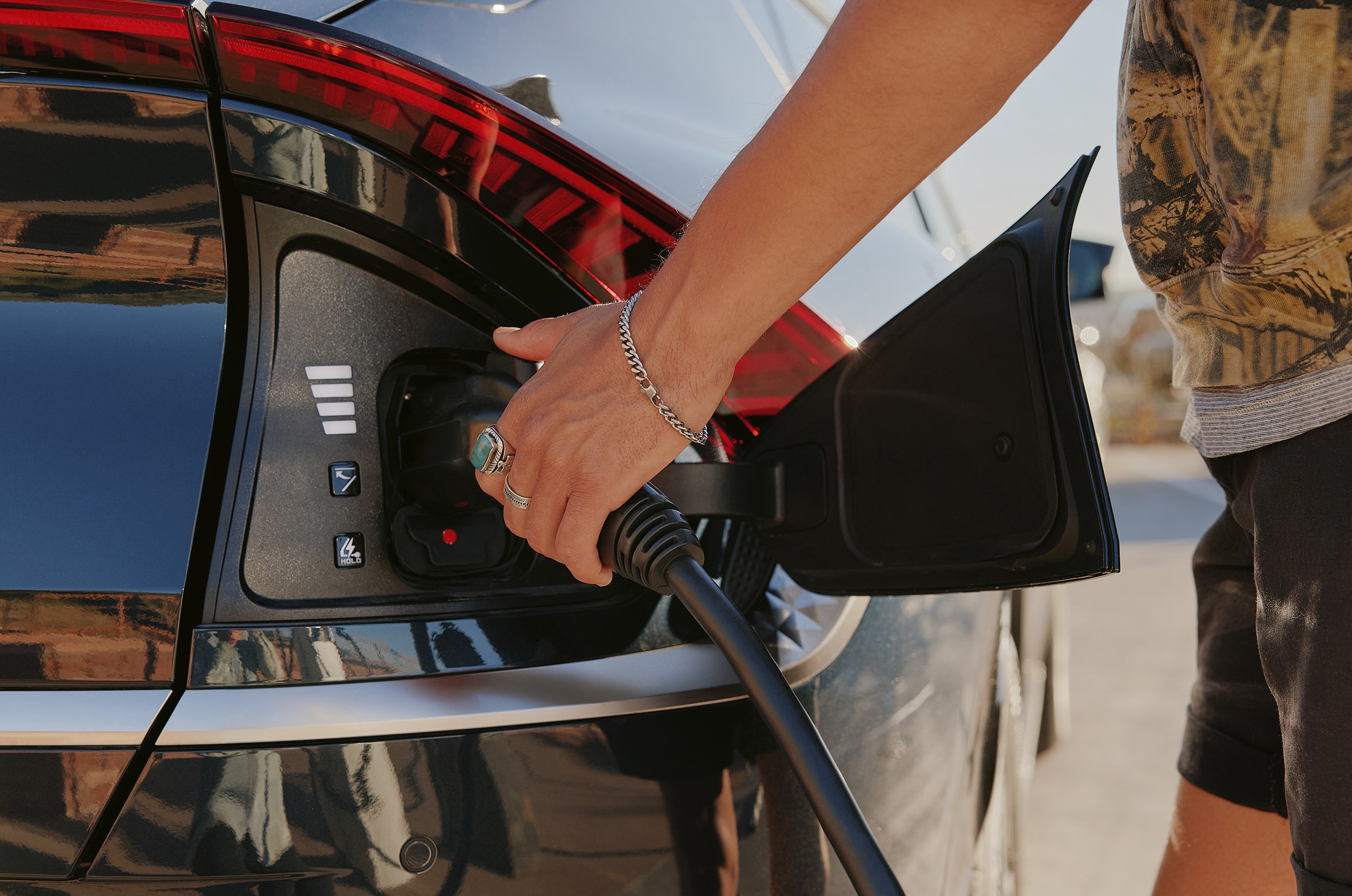Get the Facts on Driving Electric
Save Money
Save Money—Upfront Purchase Cost and Over the Life of your Vehicle
With the cost of at-home charging being a fraction of the cost of gas and minimal ongoing maintenance costs for EVs, you’ll soon benefit from more savings than you would with its gas-powered equivalent. Learn more about how much you can save by driving electric.
Are EVs Expensive?
With more than 30 fully electric and plug-in hybrid models starting under $45,000 (and many under $30,000) including sedans, crossovers and SUVs, there are now EVs for many budgets. Visit our Find Your EV page, where you’ll find links to helpful resources, including an EV shopper tool. You can even compare the total cost of ownership between an EV and a similarly styled gas-powered vehicle to see the many ways EVs allow you to save.
- $26,875
The starting price of the Hyundai KONA Electric once you factor in 2025 state tax credits. Does not include destination freight charges. Subject to change. - $28,140
The starting MSRP of the new Nissan Leaf, not including any purchase incentives that could reduce the cost even further.

All Coloradans Are Eligible for EV Tax Credits
If you’re a taxpayer in Colorado, you’re eligible for a state tax credit when you buy or lease an electric vehicle. Right now, the Colorado EV tax credit is valued at $750 for a new EV with an MSRP up to $80,000. Vehicles priced under $35,000 may qualify for an additional $2,500 credit, totaling up to $3,250 in state incentives.
Note: The Colorado Energy Office does not offer tax advice. Please consult a licensed tax professional for guidance. For questions, contact the Colorado Department of Revenue Taxpayer Helpline.
- Up to $3,250 in state tax credits!
Colorado taxpayers are eligible for a $750 state tax credit when you purchase or lease a new EV with an MSRP up to $80,000. Lease agreements must have an initial term of at least two years. EVs under $35,000 MSRP are eligible for an additional tax credit of $2,500. To learn more, click here. - 30% off home charging
The federal government offers a tax credit of 30% off the purchase and installation of at-home Level 2 charging, up to $1,000. To learn more, click here. If you’ve purchased an EV charger for your home, visit the IRS website to learn how to claim this deduction on your taxes.
Swap Your Gas Vehicle for an EV With Colorado’s Vehicle Exchange (VXC) Program!
The Vehicle Exchange Colorado (VXC) program helps income-qualified Coloradans recycle and replace their old or high-emitting vehicles with electric vehicles. The VXC rebate will partially cover the upfront cost of the EV at the time of purchase or lease from an authorized automobile dealer. Starting November 3, 2025, VXC participants can receive a rebate of $9,000 towards a new Battery Electric Vehicle (BEV) or Plug-in Hybrid Electric Vehicle (PHEV) with a manufacturer’s suggested retail price (MSRP) or purchase price of $80,000 or less. Participants can receive $6,000 towards a used BEV or PHEV with a final negotiated purchase price of $50,000 or less. Only one VXC rebate is allowed per tax household. Visit the Colorado Energy Office website to learn more about the vehicle exchange program.
- $9,000 Towards A New EV
Eligible Coloradans can receive a $9,000 rebate towards the purchase or lease of a new BEV or PHEV. - $6,000 Towards A Used EV
Eligible Coloradans can receive a $6,000 rebate towards the purchase or lease of a used BEV or PHEV. - Up to $15,000 in Savings
Combine the VXC rebate with Colorado’s state EV tax credit for maximum savings of up to $15,000.
Utility Incentives Can Save You Even More!
Some Colorado utility companies, like Xcel Energy, Black Hills Energy, Holy Cross Energy, San Isabel Electric Association, and Gunnison County Electric Association offer even more incentives for Coloradans who live in their service territories. In addition to rebates, some utilities also offer “time of use” rates, which reward their residential customers with reduced electricity prices for charging overnight. Visit the US Department of Energy’s Alternative Fuels Data Center to see all utility incentives currently available in Colorado.
At this time, the Black Hills Energy EV rebate cannot be stacked with the state tax credit.
- Xcel Energy
Residential customers may be eligible for a rebate of up to $1,300 on home wiring costs related to installing a Level 2 charger. - Holy Cross Energy
Residential customers are eligible for up to $549 in rebates towards the purchase of a level 2 charger. Multiple manufacturers are eligible. Installation costs can be rolled into your monthly bill, spreading it over 3 years to lower your upfront costs. - San Isabel Electric Association
Residential customers are eligible for a $500 rebate towards the purchase of qualified EVs. - Gunnison County Electric Association
Residential customers are eligible for a rebate for 50% of the cost to purchase and install an EV charger, up to $1,250. - Black Hills Energy
Residential customers are eligible for a $500 rebate towards the installation of an at-home Level 2 charger. Income-qualified residential customers can receive up to $1,300 in rebates towards the purchase and installation of an at-home Level 2 charger. Residential customers who are income qualified may receive rebates of up to $2,500 towards the purchase of a new or pre-owned EV. - United Power
Residential customers are offered the purchase and installation of a Level 2 charger at home for $19 per month, which also covers maintenance or repairs if needed. If you have your own charger, United Power offers a $1,000 rebate towards its installation. - Yampa Valley Electric Association
Residential customers can be eligible for a $250 rebate towards the purchase and installation of a Level 2 charger. - La Plata Electric Association
Residential customers can receive up to two at-home Level 2 EV chargers and up to $500 towards installation costs, or up to a $500 rebate off the price of your own at-home charger and installation costs. - Poudre Valley Rural Electric Association
Residential members qualify for up to a 50% rebate on expenses associated with buying and installing an Electric Vehicle Charger, with a maximum rebate amount of $1,000.

The Cost to Charge Compared to the Price of Gas
Charging costs are one of the biggest ways that EV drivers save money when switching over from a gas-powered car. In Colorado, at an average of $0.13 per kilowatt hour at home, you can save up to 75% to “fill up” at home compared to the price of gasoline.
What if you’re charging on the go? While you may pay more to charge at public stations than you do at home, it’s still no more expensive than filling up with gas, and oftentimes cheaper. Visit Energyinnovation.org to view EV fill up savings by state and Plugshare.com to learn more about the price of public charging near you.
- 350 miles for only $10
To completely charge an EV like the Tesla Model 3 at home, it would only cost you approximately $10.66 and will get you up to 350 miles in range. The Rivian R1T truck can fully charge for as little as $17.55. - Goodbye high gas bills
The average gas-powered vehicle gets 28 miles per gallon, meaning that filling up your tank could cost $50 or more each time. Charging your EV will only cost a fraction of that. - Predictably stable pricing
The price of electricity is much more stable than the price of gas, keeping your charging costs at home much more predictable and consistent than your gas budget.
Maintenance Costs
Think electric vehicles come with even more maintenance than your current gas-powered car? Think again! Fully electric cars use approximately 20 moving parts, as opposed to more than 2,000 moving parts found in gas-powered cars. This means you’ll have fewer parts to maintain over your car’s lifespan, leading to lower maintenance costs.
Fully electric vehicles don’t need oil changes, transmissions and transmission fluid, timing belts, spark plugs, and other components that need regular maintenance or repair. Even your brakes last a lot longer due to regenerative braking.
- 50% less costly to maintain
Some studies have found EVs to be 50% less costly to maintain compared to gas-powered cars. - 8 years or 100,000 miles
Federal law requires automakers to keep their EV batteries under warranty for at least 8 years or 100,000 miles, but many EV batteries are made to last 200,000 — 300,000 miles. - 95%-98% reusable battery metals
EV batteries are made up of metals that can be reused or recycled to create a new battery. Many US-based lithium-ion recycling companies can recover 95% - 98% of critical battery materials for second-life use.
